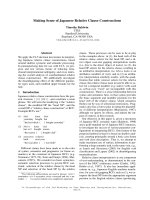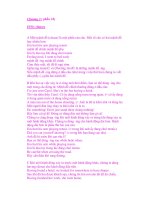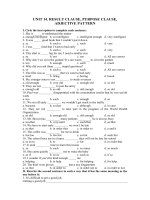Subordinate clause
Bạn đang xem bản rút gọn của tài liệu. Xem và tải ngay bản đầy đủ của tài liệu tại đây (11.96 KB, 1 trang )
Subordinate clause
A subordinating conjunction and its clause can go either before or after the main clause (depending on what is to
be emphasized).
If you need money, just let me know.
Just let me know if you need money.
Although the necklace was expensive, she bought it.
She bought the necklace although it was expensive.
Because she was too angry, she tore up the letter.
She tore up the letter because she was too angry.
When a subordinate clause begins a sentence, it is often separated by a comma, even if it is short. Conjunctions
in separate sentencesNormally a conjunction connects two clauses into one sentence. However, sometimes, a
conjunction and its clause can stand alone. This usually happens in answers.
‘Why are you crying?’ ‘Because John hit me.’
‘When are you going to start?’ ‘When I am ready.’
‘Why did you buy it?’ ‘Because I liked it.’
Writers often separate clauses for emphasis.
Something has to be done. Before it gets too late. (Instead of ‘Something has to be done before it gets
too late.’)
Afterthoughts can also be introduced by conjunctions.
OK, I did it – But I didn’t mean to.
Stay on top of your writing! Download our grammar guide from www.englishgrammar.org to stay up-to-date.
Powered by TCPDF (www.tcpdf.org)









